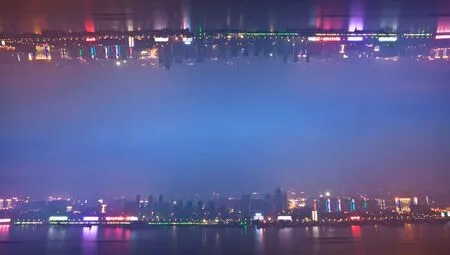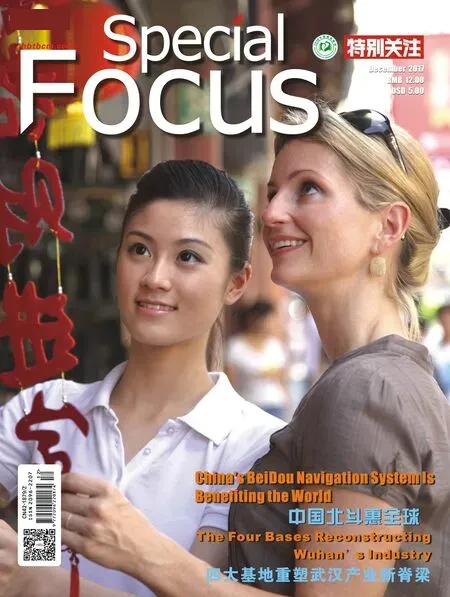Relocation to Wuhan
2018-01-05ByLucPauwelsBelgiumTranslationbyHuangYongming
By Luc Pauwels [Belgium] Translation by Huang Yongming
Relocation to Wuhan
By Luc Pauwels [Belgium] Translation by Huang Yongming

Finally I had left Xi’an behind me and it all felt good after months of uncertainty and distress. By the end of June 2006, my wife and I had settled into a small but cozy apartment on Hong Kong road in Hankou. We felt happy, being around each other, day in and day out.
During the first few days I kept myself busy with grocery shopping, experimenting with Chinese and Western dishes, cleaning, reading, and making new friends. The new environment was hot and humid,and every day delicious foods and the pleasant buzz of activity welcomed me. Discovering Wuhan felt like an extended holiday, hopping on and off buses, walking through old lanes,parks and markets, and sipping coffee in a 20 square meter coffee bar along Xibei Lake.
On the internet I had read some articles on relocation and the stress it could involve, like emotional reactivity, irritability,and sometimes even anxiety and confusion. In 1999, six weeks into my relocation from Belgium to China, I experienced a sudden sadness while reading a pleasant novel at my flat—a sign of anxiety and confusion. This time,however, I was not really sure if I was feeling stress symptoms or perhaps I was instead coping well with the relocation stress.
I had decided, on my arrival in Wuhan, to discover the city,establish new friendships, relaunch my career, and nurture my family.
Discovering Wuhan was pure pleasure, and my personal top three ‘Must-Visit-Places’ at that time were the Yangtze River Ferry Crossing, Jiefang (Liberation)Park, and the many lanes in the Old Hankou neighborhoods.The Yangtze River Crossing,with great views of the Wuhan Yangtze Great Bridge, enchanted me most around sunset, while a visit to Liberation Park in the early mornings was a marvel where I could observe thousands of people doing Tai Chi, Yoga,meditation, and other traditional exercises.
Walking around the traditional lanes of Old Hankou was my favorite pastime during moments of ref l ection and distress. For the first time since my graduation I hadn’t received a salary on myaccount, nor did I have to walk to the office on a Monday morning,leaving me with plenty of time to wander around the many‘lilongs’ of Old Hankou.

解放公园Jiefang Park
离开西安之后,经过数月的犹豫和痛苦的思考,2006年6月底,我和妻子在汉口的香港路附近安顿下来,住进一间小而舒适的公寓房里。
刚搬来的那几天,我常常忙于大包小包地购物,品尝新奇的中西餐点,打扫房间,阅读书刊,结交新朋友。陌生的环境,炎热潮湿的气候,美味的食物和街巷飘浮的嗡嗡噪音,都让人感到新鲜和愉悦。来到武汉就像度一个长假,我们从繁忙的公共汽车上跳上跳下,穿小巷,游公园,逛市场,经常到西北湖的一家20平方米的小店品啜咖啡。
我读过一些异地迁居的文章,人们迁居到陌生环境时,有可能因为压力伴随相当大的情绪反应,变得迷茫、焦虑甚至易怒。1999年,我从比利时来到中国的时候,最初的六周时间,我困在一间公寓房内,靠一本轻松小说解闷,书读到末尾,我却悲从中来,就是这种焦虑感的体现。而这一次搬到武汉,我似乎并未感受到多么不安,也许我已经能够从容地适应新环境。
亦即在我抵达武汉的时候,我就决心熟悉这座城市,结识新朋友,重新拓展我的事业,并过好我的小家。
熟悉武汉是一桩乐事。我以为,武汉有三大美景:长江码头,解放公园,老汉口的许多小巷。
自毕业以来,我头一次没有在我的账户上打进任何薪水,也没有在周一早上去上班,我于是有充足的时间游逛,在老汉口的许多传统里弄猎奇。那里街连街,巷连巷,多是19世纪末和20世纪初建造的老房子。
我喜欢在老汉口穿行。一条里弄有一条人行道,两旁是传统的砖房。著名的三德里,建于1901年,中心地带有一个小广场通向四面八方,我特别喜欢在那一带跑步,有一种奇妙的感觉。
周末,我喜欢与朋友们一起逛KTV,去老汉口吃夜宵。
我的第一首中文歌,就是在武汉学会的。《月亮代表我的心》,“你问我爱你有多深,我爱你有几份”,歌词深深代表着我对亲友们的情意。
我结识了一些中国朋友。黎黄陂路有一家私人诊所,主人是位姓魏的中医名医。我逛街的时候看到他的海报,于是打开诊所的店门,走进去。我用汉语问候他,还告诉他,我打算办一家语言培训中心。“太好了。”他用英语回答。魏医生开朗大方,在我看来,他是一个值得信赖的正直的人。
魏医生有两个孩子,女儿漂亮,学习成绩很好,儿子却很顽皮,成绩较差。说起功课,“头痛啊!”他笑着说。
Lilongs (里 弄) or lane houses refer to a group of houses connected by a lane or that are part of a series of interconnected lanes. They were mainly constructed in the late 19th and early 20th centuries.The Sandeli Community, a square complex built in 1901, which consists of four lanes of two story terrace-houses running in each of the cardinal directions that join together at a round square, was my favorite one in Old Hankou.
Soon I began to engage actively in social exchanges by adding weekly KTV visits and late night snacks in the streets of old Hankou to my regular social life of dinners and drinks with friends. In Wuhan, I learned my first Chinese song, ‘Yueliang DaiBiao Wode Xin’ or ‘The Moon Represents My Heart,’ bringing it to a regular audience of friends and relatives at the KTV.
Ni wen wo aini you duo shen,You ask me how deep my love for you is,Wo aini you ji fen…How much I really love you …
New friends came, foreign ones as well as Chinese ones.Doctor Wei, a Chinese traditional medicine doctor with a private practice on Lihuangpi Road, was one such Chinese friend. It was during one of my walks through Old Hankou that I stopped in front of his cabinet after having observed the Chinese traditional medicine posters and skeletons inside his cabinet. I opened the door and walked in. We greeted each other in Chinese and started a simple but pleasant conversation. I then shared my new business idea, the opening of a language training center,with Dr. Wei. “Wonderful!”he responded in funny and melodious English. Dr. Wei was an enjoyable, trustworthy, and righteous man, in my eyes.
I quickly learned that Dr. Wei had two children, a daughter who was very beautiful and good at school, and a son who was lazy and poor at school.
“Headache!” he shouted followed by laughter.
Opening a language training center was not really my first choice. I could have opted for trading or selling Belgian chocolates, beer, and perhaps diamonds, all opportunities I had zero experience in. So training students was not such a bad choice, after all. For me, as an educator and multi-linguist,the decision to start a training business was making it possible to express myself again, to plan and implement, and to work towards objectives.

老汉口街景 Streetscape of Old Hankou
Relocation had shaken up my life somewhat, but it had also made me more adaptable, openminded, and independent. Living in another city was an eye-opener as I was able to observe things from an outsider’s perspective,re-framing the way I used to look at myself. Moving to Wuhan had definitely helped me to build up courage to be independent and to face uncertainty on my own.It all felt like building up a new identity, getting to know myself better and being able to become the person I truly wanted to be.
I was easily finding my way around the city of rivers and lakes, and soon my career would receive a boost with the opening of my language training center that I had named Global Learning for Life (GLL). On the family side, my wife and I were keeping ourselves busy discovering each other, including our differences and slight annoyances. There were bed-time differences, eating habit differences, differences in appreciating humor, and in social life.
I preferred, for example, going to sleep before 11 p.m. while my wife would stay up till midnight reading in bed. In social life my wife would meet friends,associates, entrepreneurs, and decision-makers on a daily basis,while I preferred staying home more than going out. And then small irritations began to appear when somebody would call my wife around 11 o’clock in the evening. “Please tell them to call back in the morning instead of at 11 o’clock at night!” I snapped.
“I don’t want to offend anyone”she whispered back.
Virginia Woolf once wrote that “Growing up is losing some illusions, in order to win others,”and that’s exactly how my relocation from Xi’an to Wuhan felt to me.♦(Photos by Shi Hai)

武汉关大楼 The building of Wuhan Customs
开办语言培训中心并不是我的第一选择。我可以选择去做贸易,销售比利时巧克力,欧洲啤酒或者钻石,一切需要从零开始。而作为一名教育工作者,培训可以锻炼我的表达能力。
我的语言培训中心顺利开办起来,名叫“全球学习生活”。在家庭生活方面,我和妻子相互包融,包括理解彼此差异,消除轻微的烦恼。我们有睡眠习惯、饮食、幽默感、社交生活等方面差异。
我喜欢在晚上11点之前睡觉,妻子喜欢在床上看书,通常看到半夜。她每天都会与朋友、同事或企业家见面,我更喜欢待在家里。当有人在晚上11点左右打来电话,找我妻子时,我说:“请转告你的朋友最好推迟到明早打来,而不是闹到晚上11点还在打电话。”
“我不想冒犯任何人。”她平静地回答。
作家伍尔夫说:“成长的过程就是丢去一些幻想,才能有所得。”这也是我在武汉生活的感悟。居住在陌生城市让我大开眼界,我能从局外人的角度观察事物,重新审视自己。♦
比利时人体验武汉生活
文/路跑[比利时] 译/黄永明
(摄影/石海)
